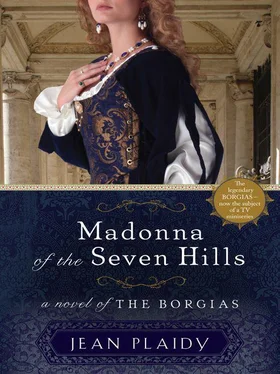Виктория Холт - Madonna of the Seven Hills
Здесь есть возможность читать онлайн «Виктория Холт - Madonna of the Seven Hills» весь текст электронной книги совершенно бесплатно (целиком полную версию без сокращений). В некоторых случаях можно слушать аудио, скачать через торрент в формате fb2 и присутствует краткое содержание. Жанр: Исторические любовные романы, на английском языке. Описание произведения, (предисловие) а так же отзывы посетителей доступны на портале библиотеки ЛибКат.
- Название:Madonna of the Seven Hills
- Автор:
- Жанр:
- Год:неизвестен
- ISBN:нет данных
- Рейтинг книги:4 / 5. Голосов: 1
-
Избранное:Добавить в избранное
- Отзывы:
-
Ваша оценка:
- 80
- 1
- 2
- 3
- 4
- 5
Madonna of the Seven Hills: краткое содержание, описание и аннотация
Предлагаем к чтению аннотацию, описание, краткое содержание или предисловие (зависит от того, что написал сам автор книги «Madonna of the Seven Hills»). Если вы не нашли необходимую информацию о книге — напишите в комментариях, мы постараемся отыскать её.
Madonna of the Seven Hills — читать онлайн бесплатно полную книгу (весь текст) целиком
Ниже представлен текст книги, разбитый по страницам. Система сохранения места последней прочитанной страницы, позволяет с удобством читать онлайн бесплатно книгу «Madonna of the Seven Hills», без необходимости каждый раз заново искать на чём Вы остановились. Поставьте закладку, и сможете в любой момент перейти на страницу, на которой закончили чтение.
Интервал:
Закладка:
The Orsinis had many palaces in Rome but Adriana and her family lived in that on Monte Giordano, near the Bridge of St. Angelo. And it was to this palace that Lucrezia and Cesare were taken when they said good-bye to their brothers and their mother.
Here life was very different from what it had been in the house on the Piazza Pizzo di Merlo. With Vannozza there had been light-hearted gaiety, and the children had enjoyed great freedom. They had been allowed to wander in the vineyards, or to enjoy trips on the river; they had often visited the Campo di Fiore where it had given them great delight to mingle with all kinds of people. Cesare and Lucrezia realized that life had indeed been changed.
Adriana was awe-inspiring. She was a beautiful woman but always dressed in ceremonial black, insisting constantly that it must not be forgotten that this was a Spanish household even though it was in the heart of Italy. With its great towers and crenellations dominating the Tiber, the palace was gloomy; its thick walls shut out the sunshine and the gaiety of the Rome which the children had known and loved. Adriana never laughed as Vannozza had laughed, and there was nothing warm and loving about her.
She had many priests living in the palace; there were constant prayers, and consequently Lucrezia believed in those first years in the Orsini palace that her foster-mother was a very virtuous woman.
Cesare chafed against the discipline, but even he was unable to do anything about it, even he was overawed by the gloomy palace, the many prayers and the feeling that the palace was a prison in which he and Lucrezia had been incarcerated while Giovanni had been allowed to go in pomp and splendor to Spain and glory.
Cesare brooded silently. He did not rage as he had in his mother’s house; he was sullen and sometimes his quiet anger frightened Lucrezia. Then she would cling to him and beg him not to be sad; she would cover him with kisses and cry out that she loved him best of all … better than anyone else in the whole world, that she would love him today, the next day and forever.
Even this declaration could not appease him, and he remained brooding and unhappy, but sometimes he would turn to her and seize her in one of those fierce embraces which hurt her and excited her. Then he would say: “You and I are together, little sister. We’ll always love each other … best in the world … best in the whole world. Swear it to me.”
And she swore it. Sometimes they would lie together on her bed or his. She would go there to comfort him, or he would come to her for comfort. Then he would talk of Giovanni and how unfair life was. Why did their father love Giovanni? Cesare would demand. Why should not Cesare have been the one who was chosen to go to Spain? Cesare would never go into the Church. He hated the Church, hated it … hated it.
His vehemence frightened her. She crossed herself and reminded him that it was unlucky to talk thus against the Church. The saints, or perhaps the Holy Ghost might be angry and come to punish him. She was afraid, she said; but she said it to give him the chance of comforting her, to remind him that he was great Cesare, afraid of none, and she was little Lucrezia who was the one to be protected.
Sometimes she made him forget his anger against Giovanni. Sometimes they laughed together and remembered the fun they had had on their jaunts to the Campo di Fiore. Then they would swear that no matter what happened they would always love each other best in the world.
But during those first months the children felt that they were prisoners.
Roderigo visited themat Monte Giordano.
In the early days Cesare asked that they might go home, but Roderigo, fond father though he was, could be firm when he felt himself to be acting for the good of his children.
“My little ones,” he said, “you have been running wild in the house of your mother. But to run wild is for little children, not for big ones. It is not meet that you should pass your time in that humble house. A great future awaits you both. Trust me to judge what is best for you.”
And Cesare knew that when his father’s face was set in those lines there was nothing to be done about it. He had to obey.
“Very soon,” Roderigo told Cesare, “you will be leaving this house. You will be going to the university. There you will have great freedom, my son; but first I would have you know how to act like a nobleman, and although there is discipline here such as you have never encountered before, this is necessary to make you worthy of what you will become. Have patience. It is but for a little while.”
And Cesare was mollified.
The head of the house of Orsini was Virginio, one of the great soldiers of Italy, and when he was at Monte Giordano, the palace resembled a military camp. Virginio shouted orders to all, and the serving men and maids scurried hither and thither, in fear of displeasing the great commander.
Strangely enough Cesare, who so longed to be a soldier, had no objection to this stern rule; and for the first time in her life Lucrezia saw her brother ready to bend to the will of another. Cesare rode behind Virginio, straight as a soldier, and Virginio would often watch him and do his utmost to hide the smile of approval which touched his lips. He would watch Cesare, bare to the waist, learning to wrestle with some of the best teachers in the whole of Italy; the boy gave a good account of himself.
“That boy for the Church!” said Virginio to Adriana and Ludovico her husband. “He’s made for a military career.”
Adriana answered: “Careers in the Church, my dear Virginio bring a man more profit than those of soldiering.”
“ ’Tis a tragedy to make a prelate of him. What is Roderigo Borgia thinking of?”
“His future … and the future of the Borgias. That boy is destined to be Pope, I tell you. At least that is what Roderigo Borgia plans to make him.”
Virginio swore his soldier’s oaths and set the boy more arduous tasks, shouted at him, bullied him and Cesare did not object. He dreamed of being a great soldier. Virginio approved of his dreamings, and even went so far as to wish the boy was his son.
Thus that year was made tolerable for Cesare and, such was Lucrezia’s nature that, seeing her brother reconciled, she could become reconciled too.
But by the end of the year Cesare had left the Orsini palace for Perugia, and Lucrezia wept bitterly in her loneliness. Then she suddenly began to realize that with Cesare absent she enjoyed a certain freedom, a certain lack of tension; she found that she could begin to consider what was happening to herself irrespective of Cesare.
Lucrezia was growingup and her religious education must not be neglected, since that formed the background of the education of all Italian girls of noble birth. Most of them went into convents, but Roderigo had given much anxious thought to this matter, for the behavior in convents was not always above reproach and he was determined to protect his Lucrezia. The Colonnas sent their daughters, it was true, to San Silvestro in Capite, and the convents of Santa Maria Nuova and San Sisto he believed were equally worthy; so he decided that it should be San Sisto’s on the Appian Way to which Lucrezia should go for religious instruction. She was to stay there only for brief periods though, and she returned often to Monte Giordano where she was instructed in languages—Spanish, Greek and Latin—as well as painting, music and fine needlework.
It was not necessary, Roderigo had pointed out to Adriana, that his little daughter should become a virago (a term which in those days simply meant a learned woman). He wished his Lucrezia to be highly educated that she might be a worthy companion for himself. It was vital that she should be instructed in deportment, that she should acquire the airs and graces of a noblewoman and be able to take her place among Kings and Princes; he wished her to be modest in her demeanour. Her serenity of character gave her a charming graciousness which was apparent even at the age of seven, when she began this course of grooming; that, Roderigo wished to be preserved, for, as he saw his little daughter growing in beauty every day, he was becoming more and more ambitious on her account.
Читать дальшеИнтервал:
Закладка:
Похожие книги на «Madonna of the Seven Hills»
Представляем Вашему вниманию похожие книги на «Madonna of the Seven Hills» списком для выбора. Мы отобрали схожую по названию и смыслу литературу в надежде предоставить читателям больше вариантов отыскать новые, интересные, ещё непрочитанные произведения.
Обсуждение, отзывы о книге «Madonna of the Seven Hills» и просто собственные мнения читателей. Оставьте ваши комментарии, напишите, что Вы думаете о произведении, его смысле или главных героях. Укажите что конкретно понравилось, а что нет, и почему Вы так считаете.











